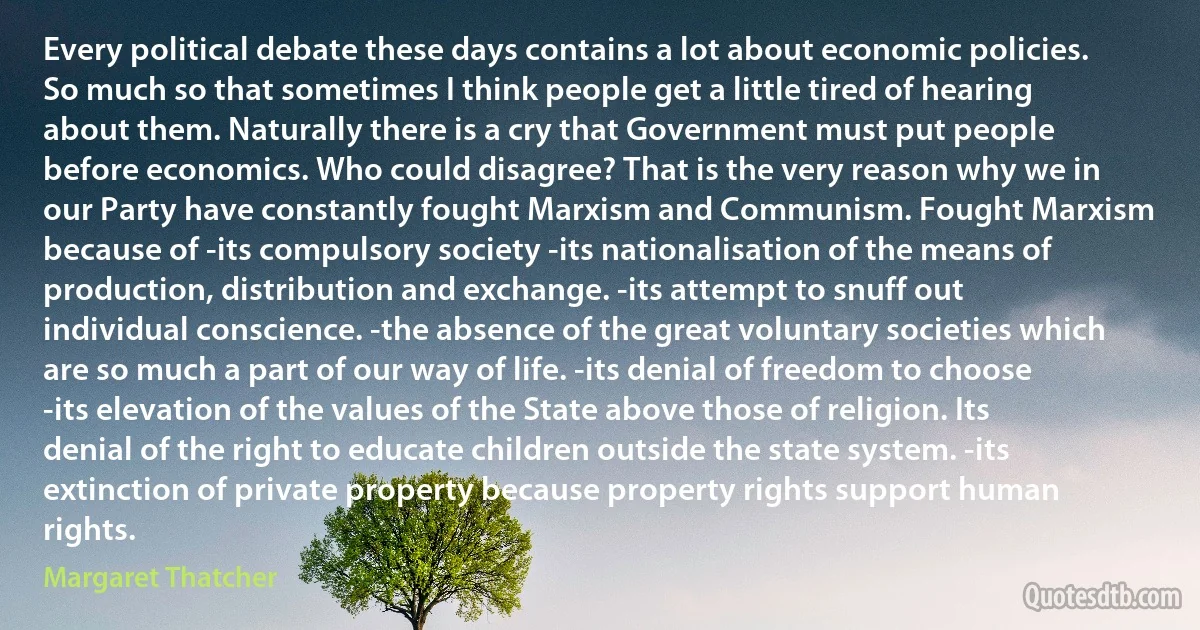
Every political debate these days contains a lot about economic policies. So much so that sometimes I think people get a little tired of hearing about them. Naturally there is a cry that Government must put people before economics. Who could disagree? That is the very reason why we in our Party have constantly fought Marxism and Communism. Fought Marxism because of -its compulsory society -its nationalisation of the means of production, distribution and exchange. -its attempt to snuff out individual conscience. -the absence of the great voluntary societies which are so much a part of our way of life. -its denial of freedom to choose -its elevation of the values of the State above those of religion. Its denial of the right to educate children outside the state system. -its extinction of private property because property rights support human rights.
Margaret ThatcherRelated topics
above absence attempt children choose conscience cry debate distribution economics elevation extinction fight freedom government great hearing human life outside party people production property reason religion right state support think way means days marxism nationalisationRelated quotes
Economists, like everyone, have their political biases, but these are by no means as strong an influence on what they are willing to consider as you might think. For example, one might have thought that strongly liberal economists like, say, James Tobin would be at least mildly sympathetic to the views of radical economists who draw their inspiration from Marx, or of heterodox economic thinkers like Galbraith. After all, in such fields as history and sociology the Marxist or post-Marxist left has long received a respectful hearing. And yet you don't find this happening: liberal economists are almost as quick as their conservative colleagues to condemn heterodox leftist ideas as foolish it was the liberal Robert Solow, not Milton Friedman, who defended orthodoxy in the bitter "capital controversy" with British radicals.

Paul Krugman
The growth in money and credit has outpaced both savings and economic growth. These inflationary pressures have been concentrated in asset prices, not consumer price inflation--keeping monetary policy too easy. This increase in asset prices has fueled domestic borrowing and spending. Government policy and the increase in securitization are largely responsible for this bubble. In addition to loose monetary policies by the Federal Reserve, government-sponsored enterprises Fannie Mae and Freddie Mac have contributed to the problem. The fourfold increases in their balance sheets from 1997 to 1998 boosted new home borrowings to more than $1.5 trillion in 1998, two-thirds of which were refinances which put an extra $15,000 in the pockets of consumers on average--and reduce risk for individual institutions while increasing risk for the system as a whole.

Ron Paul
What I do not see is the argument...that we ought somehow to go on a quite different issue, a purely economic issue, to this new extreme which seems, greatly to my regret, to have inspired part of my party. There are no longer the principles of Lord Shaftesbury, Mr. Disraeli or Mr. Churchill. We are reverting to a form of neo-Cobdenism based upon the worst elements of the Manchester school, supported by aphorisms that would have done honour to that popular writer, Dr. Samuel Smiles. The paternalist elements and traditions of the Tory Party that come from its very roots are now unpopular. We are making a great error. It is because the people as a whole trusted those whom they regarded as their natural leaders to help them, support them and protect them that we have had the great authority in the past in our country.

Harold Macmillan
For what advantage is it, that the world enjoys profound peace, if thou art at war with thyself? This then is the peace we should keep. If we have it, nothing from without will be able to harm us. And to this end the public peace contributes no little: whence it is said, ‘That we may lead a quiet and peaceable life.' But if any one is disturbed when there is quiet, he is a miserable creature. Seest thou that He speaks of this peace which I call the third (inner, ed.) kind? Therefore when he has said, ‘that we may lead a quiet and peaceable life,' he does not stop there, but adds ‘in all godliness and honesty.' But we cannot live in godliness and honesty, unless that peace be established. For when curious reasonings disturb our faith, what peace is there? or when spirits of uncleanness, what peace is there?

John Chrysostom
If Christ were to walk in this world today, do you know what would happen to Him? He would be placed in a mental institution and given psycho-therapy, just as would His Saints. The world would crucify Him today just as it did 2000 years ago, for the world has not learned a thing, except more devious forms of hypocrisy. And what would happen if, in one of my classes at the university, I would one day tell my students that all the learning of this world is of no importance beside the duty of worshipping God, accepting the God-man who died for our sins, and preparing for the life of the world to come? They would probably laugh at me, and the university officials, if they found out, would fire me-for it is against the law to preach the Truth in our universities. We say that we live in a Christian society, but we do not: we live in a society.

Seraphim Rose
